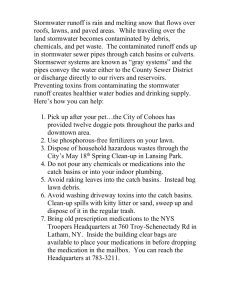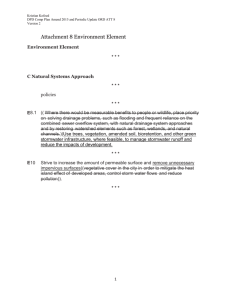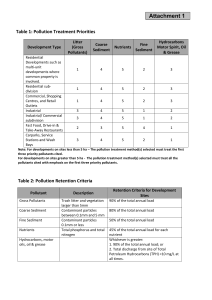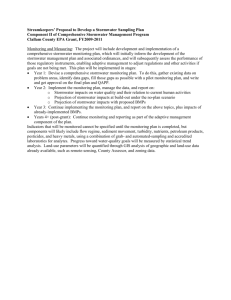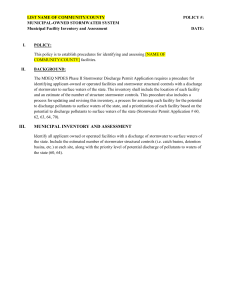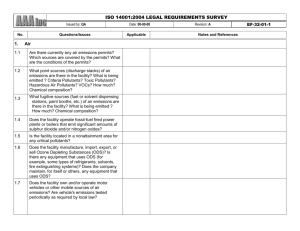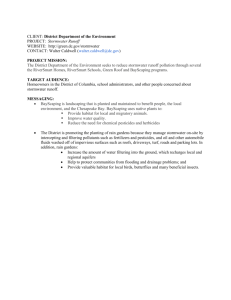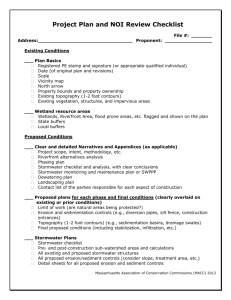Pollution Prevention Procedure
advertisement
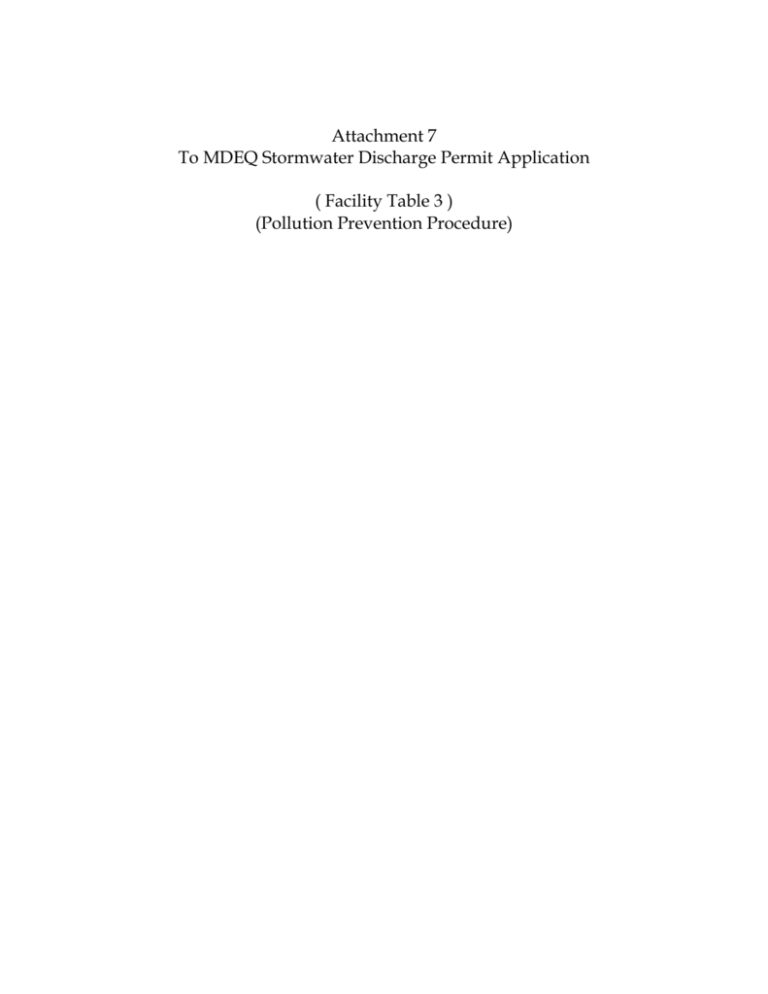
Attachment 7 To MDEQ Stormwater Discharge Permit Application ( Facility Table 3 ) (Pollution Prevention Procedure) Pollution Prevention Procedure Attachment 7 to MDEQ Stormwater Discharge Permit Application Pollution Prevention and Good Housekeeping Program: 61. Provide the procedure for updating and revising the inventory in Question 59 and map (or maps) identified in Question 60 as facilities and structural stormwater controls are added, removed, or no longer owned or operated by the applicant. A suggested timeframe for updating/revising the inventory and map(s) is 30 days following adding/removing a facility or structural stormwater control. If you do a construction project , if you add a catch basin, if you make any change to properties you own or the structural storm water control, what is the timeframe that the it will be revised on your maps, also the inventory on Table 3 should be updated at the same time. Does not have to be 30-days but should at least do yearly (annual report). Explain below how you are going to ensure that happens. 62. Provide the procedure for assessing each facility identified in Question 59 for the potential to discharge pollutants to surface waters of the state. The procedure shall include a process for updating and revising the assessment. A recommended timeframe for updating/revising the assessment is 30 days prior to discharging stormwater from a new facility and within 30 days of determining a need to update/revise the facility assessment. The applicant should consider the following factors when assessing each facility: • Amount of urban pollutants stored at the site (e.g., sediment, nutrients, metals, hydrocarbons, pesticides, fertilizers, herbicides, chlorides, trash, bacteria, or other site-specific pollutants) • Identification of improperly stored materials • The potential for polluting activities to be conducted outside (e.g., vehicle washing) • Proximity to waterbodies • Poor housekeeping practices • Discharge of pollutants of concern to impaired waters Per Stephanie: Basically, the State is looking for the permittee to indicate that they did an assessment on each of the facilities listed in Question 59 for the potential to discharge pollutants to surface water based on the criteria listed in the application or other criteria if applicable. They should indicate that new facilities will be assessed within (timeframe) and existing facilities will be reassessed within (timeframe) of determining a need to update/revise the facility assessment. 69. Provide the procedure identifying the BMPs currently implemented or to be implemented during the permit cycle to prevent or reduce pollutant runoff at each facility with the medium and lower potential for the discharge of pollutants to surface waters of the state using the assessment and prioritized list in Questions 62 and 63. For those facilities that you prioritized as medium and low potential for pollutant runoff you will need: To have identified the BMPs you currently have (catch basin cleanout/ street sweeping/ detention basins…) Identify BMPs needed. Schedule for implementation of new BMPs You may write a procedure here or attach your existing procedure. Reference in Application Procedure: 70. Provide the procedure for prioritizing each catch basin for routine inspection, maintenance, and cleaning based on preventing or reducing pollutant runoff. The procedure shall include assigning a priority level for each catch basin and the associated inspection, maintenance and cleaning schedule based on preventing or reducing pollutant runoff. The procedure shall include a process for updating/revising the priority level for a catch basin giving consideration to inspection findings and citizen complaints. A recommended timeframe for updating/revising the procedure is 30 days following the construction of a catch basin or a change in priority level. Townships with only a few catchbasins still need to provide a procedure, but do not need to give a priority level because there are so few catchbasins. You may write a procedure here or attach your existing procedure. Reference in Application Procedure: 71. Provide the geographic location of the catch basins in each priority level using either a narrative description or map. Provide either map(s) or a narrative description to show where the catch basins are in the Medium priority level. Provide either map(s) or a narrative description to show where the catch basins are in the Low priority level. . Reference in Application Narrative Description: 72. Provide the procedure for inspecting, cleaning, and maintaining catch basins to ensure proper performance. Proper cleaning methods include ensuring accumulated pollutants are not discharged during cleaning and are removed prior to discharging to surface waters of the state. A compliance assistance document titled Catch Basin Cleaning Activities Guidance Document is available at http://www.michigan.gov/documents/deq/wb-stormwaterCatchBasinGuidance_216198_7.pdf. You may have already referenced this for your High Priority Facilities, but now they want to know the procedure for inspecting, cleaning and maintaining ALL your catch basins. If you do not cleanout or maintain your own catchbasins, your procedure needs to explain how you are going to ensure your contractor will meet the requirements in the Guidance Document referenced by the State. Reference in Application Procedure for inspection: Procedure for cleaning: Procedure for maintaining: 73. Provide the procedure for dewatering and disposal of materials extracted from catch basins. A compliance assistance document titled Catch Basin Cleaning Activities Guidance Document is available at http://www.michigan.gov/documents/deq/wb-stormwater-CatchBasinGuidance_216198_7.pdf. You may have already you may have already answered this in question 72. When you or your contractor cleans a catchbasin, how is the waste product (solids and liquids) handled? If you do not cleanout or maintain your own catchbasins, your procedure needs to explain how you are going to ensure your contractor will handle the waste products to meet the requirements in the Guidance Document referenced by the State. Reference in Application Procedure for dewatering: Procedure for disposal of materials: 74. Provide the procedure for inspecting and maintaining the structural stormwater controls identified in Question 59, excluding the structural stormwater controls included in an SOP as part of Question 64 and catch basins.. The procedure shall include a description and schedule for inspecting and maintaining each structural stormwater control and the process for disposing of maintenance waste materials. The procedure shall require that controls be maintained to reduce to the maximum extent practicable the contribution of pollutants to stormwater. The procedure shall include a process for updating/revising the procedure to ensure a maintenance and inspection program for each structural stormwater control. A recommended timeframe for updating/revising the procedure is 30 days following the implementation of a new structural stormwater control. Table 3- Column 5 through 15 is your Stormwater Controls. This question is in regards to those facilities that had a Medium or Low potential for the discharge of pollutants. Column 4 (catchbasins) has already been addressed in question 72 and 73. Reference in Application Procedure for inspection: Procedure for maintenance: Procedure to update or revise the procedure for new, removed, changed sotrm water controls: 75. Provide the procedure requiring new applicant-owned or operated facilities or new structural stormwater controls for water quantity be designed and implemented in accordance with the post-construction stormwater runoff control performance standards and long-term operation and maintenance requirements. This has to do with the Channel Protection requirement (questions 39 & 40) from the ordianance/ regulatory mechanism (questions 32-33). Those questions had to do with your procedure with a 3rd party developer draining to your MS4. This is asking the same thing, but about property you own and are developing or redeveloping. Your procedures most likely the same, or you need an additional policy/ regulatory mechanism to specify that this ordinance/ regulatory mechanism also applies to properties you own. Reference in Application The Ordinance/ regulatory mechanism in (questions 32-33) in regards to stormwater controls for water quantity also apply to property owned by the municipality being acquired and operated, developed or redeveloped through the following policy: 76. Provide the procedure with the assessment of the applicant’s operation and maintenance activities for the potential to discharge pollutants to surface waters of the state. The assessment shall identify all pollutants that could be discharged from each applicable operation and maintenance activity and the BMPs being implemented or to be implemented to prevent or reduce pollutant runoff. The procedure shall include a process for updating and revising the assessment. A suggested timeframe for updating/revising the assessment is 30 days following adding/removing BMPs to address new and existing operation and maintenance activities. At a minimum, the procedure shall include assessing the following municipal operation and maintenance activities if applicable: • Road, parking lot, and sidewalk maintenance (e.g., pothole, sidewalk, and curb and gutter repair) • Bridge maintenance • Right-of-way maintenance • Unpaved road maintenance • Cold weather operations (e.g., plowing, sanding, application of deicing agents, and snow pile disposal) • Vehicle washing and maintenance of applicant-owned vehicles (e.g., police, fire, school bus, public works) You may want to create a table for this if you have a lot of operation and maintenance activities. Reference in Application or N/A if you do not have any of these activities. (Example: operation activityStoring and spreading salt. Pollutant- excessive salt. Measures taken- Salt dispensing equipment is calibrated to discharge salt at recommended rates based on speed of vehicle. Salt stockpile is kept indoors. Excess salt is swept back inside.) Procedure (with assessment ) of operation and maintenance activities: List activity. State all potential pollutants that could be discharged from that activity. What measures we are taking to prevent those pollutants from being discharged Process for updated and revising assessment: 77. Provide the procedure for prioritizing applicant-owned or operated streets, parking lots, and other impervious infrastructure for street sweeping based on the potential to discharge pollutants to surface waters of the state. The procedure shall include assigning a priority level for each parking lot and street and the associated cleaning schedule (i.e., sweeping frequency and timing) based on preventing or reducing pollutant runoff. The procedure shall include a process for updating/revising the priority level giving consideration to street sweeping findings and citizen complaints. A recommended timeframe for updating/revising the prioritization is 30 days following the construction of a new street, parking lot, or other applicant-owned or operated impervious surface or within 30 days of identifying a need to revise a priority level. If you are a Township and only own parking lots, you should not have to prioritize, but you should still discuss how you determine if and when your parking lots get swept. Reference in Application or N/A if you do not have any of these activities. Procedure: 78. Provide the geographic location of the streets, parking lots, and other impervious surfaces in each priority level using either a narrative description or map. Reference in Application if appropriate: 79. Provide the procedure identifying the sweeping methods based on the applicant’s sweeping equipment and use of additional resources in sweeping seasonal leaves or pick-up of other materials. Proper sweeping methods include operating sweeping equipment according to the manufacturers’ operating instructions and to protect water quality. If you use a contractor you still want to explain your contractors sweeping methods based on their equiptment . there is also a Guidance Document by the EPA on street sweeping. Reference in Application if appropriate: 80. Provide the procedure for dewatering and disposal of street sweeper waste material. A compliance assistance document titled Catch Basin Cleaning Activities Guidance Document is available at http://www.michigan.gov/documents/deq/wb-stormwater-CatchBasinGuidance_216198_7.pdf, This procedure may be the same or different than Catch basin cleanout. Street sweeping produces less liquid waste. Reference in Application if appropriate: 81.Provide the procedure requiring the applicant’s pesticide applicator to be certified by the State of Michigan as an applicator in the applicable category, to prevent or reduce pollutant runoff from vegetated land. A description of the categories is located at http://www.michigan.gov/mdard/0,4610,7-125-1569_16988_35289-11992--,00.html The Mich Dept of Agriculture, who licenses pesticide applicators, defines herbicides as a pesticide. Reference in Application if appropriate: Procedure: OR Not Applicable: We do not apply herbicides or pesticides except those ready to use products in their original containers that are not required to be applied by a licensed applicator. 82. Provide the employee training program to train employees involved in implementing the pollution prevention and good housekeeping program. The program shall include the training schedule. At a minimum, existing staff shall be trained once during the permit cycle and new hires within the first year of their hire date. How does your community make sure your employees get trained. There is a goddhousekeeping manuel available online. The County does provide periodic training. You do not have to have ALL you staff attend training. You can have 1 or 2 staff bring the training backand train in house. Reference in Application: Program: Schedule: 83. Provide the procedure requiring contractors hired by the applicant to perform municipal operation and maintenance activities comply with all pollution prevention and good housekeeping BMPs as appropriate. The procedure shall include the process implemented for providing oversight of contractor activities to ensure compliance. How your contracts are written can really make a difference with this requirement. Specifying how the contractor has to handle the waste products. Requiring training or a preconstruction meeting to go over storm water or other concerns. Etc. What kind of oversight do you have in place? How are you going to ensure compliance? Reference in Application: Procedure: Oversight:
